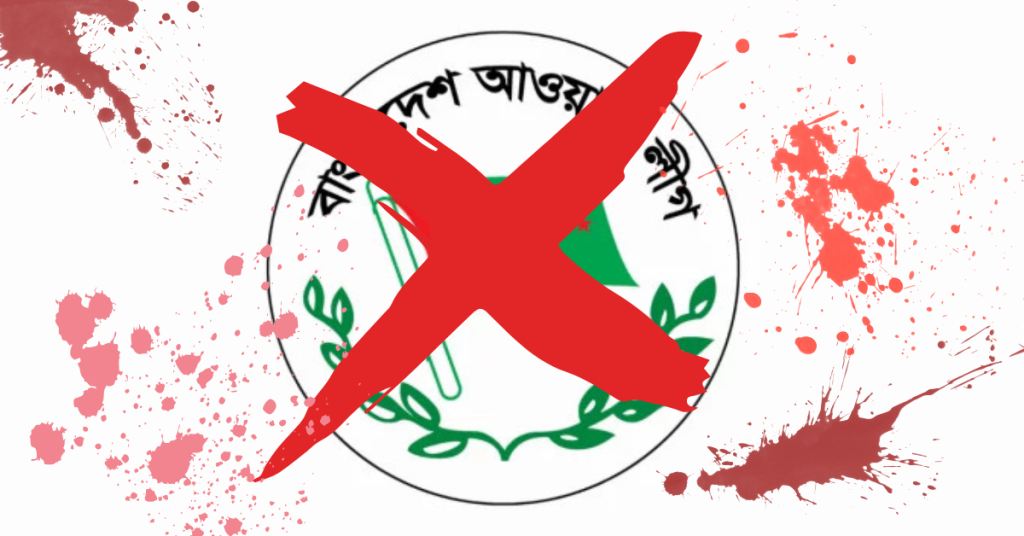In the ever-shifting political landscape of Bangladesh, symbolism and legacy matter just as much as policy. The National Citizen Party (NCP), born from a wave of discontent and revolution, has long positioned itself as the antidote to the perceived excesses and failures of the Awami League (AL). While AL has dominated much of the country’s political scene for decades, NCP’s raison d’être is deeply rooted in its historic struggle to oust AL from power. As such, following Hasnat Abdullah’s bold statement about efforts to rehabilitate Awami League and standing firmly against it, it is not only ideologically consistent but strategically advantageous for NCP to take a collectively firm stance against any attempts to rehabilitate AL—especially under a different name. In fact, spearheading a movement to ban AL altogether could revitalize NCP’s image, energize its base, and cement its place in the political mainstream.
Reminding the nation of NCP’s revolutionary legacy
Political memory is a powerful tool. The NCP was forged in a time of upheaval, rising as a formidable opposition to the AL’s perceived authoritarianism, economic mismanagement, and political cronyism. For many, the party symbolizes a break from the old guard—a force that once shook the very foundations of Bangladesh’s political order. However, in the ebb and flow of democratic cycles, revolutionary parties often risk losing their identity in the process of mainstreaming. By campaigning against AL and any attempt to revive it under a new name, NCP can reassert its revolutionary roots, reminding the public of its foundational mission.
This strategy of leaning into its legacy offers several benefits. First, it differentiates NCP from the sea of political parties vying for attention and support. While other parties may cautiously criticize AL or seek to align with parts of its legacy, NCP’s hardline stance will underscore its authenticity and ideological clarity. In a political environment where many voters feel disillusioned by compromise and corruption, clarity can be magnetic.
While other parties may cautiously criticize AL or seek to align with parts of its legacy, NCP’s hardline stance will underscore its authenticity and ideological clarity.
Capitalizing on Public Discontent
The Awami League’s long tenure in power has not been without controversy. Allegations of vote rigging, suppression of dissent, economic stagnation, and human rights violations have eroded the party’s standing among segments of the population. The NCP can seize this discontent and direct it toward a unifying cause: permanently eliminating AL’s influence on the political system.
By positioning itself as the party that will not only oppose AL but ensure its total dissolution, NCP can attract disaffected voters who crave decisive action. Moreover, the narrative of banning AL and preventing its rebirth under another name can be framed as a fight for justice—a necessary step to safeguard democracy and prevent a return to the alleged abuses of the past. In doing so, NCP can appeal to both its traditional base and newer generations who have grown skeptical of the status quo.
Preventing AL’s Rebranding and Political Resurrection
History has shown that political parties facing decline often seek rebranding as a survival tactic. AL, aware of its dwindling support, may try to shed its tarnished image by adopting a new name, leadership, and public relations strategy. Such a maneuver could confuse voters and dilute NCP’s central message.
By advocating for a legal ban on AL and monitoring any attempts at reformation under a different name, NCP can preemptively block this escape route. This approach not only maintains clarity in the political landscape but also ensures that NCP’s victory over AL is not merely symbolic or temporary. It sends a strong message that the era of AL is truly over—and that NCP is the enforcer of that end.
Strengthening party unity and momentum
Political movements need rallying points—causes that galvanize members, draw in supporters, and inspire action. The campaign to ban AL can serve as that rallying point for NCP. Internally, it provides a common goal that unites various factions within the party. Externally, it becomes a potent campaign theme that can be used in speeches, media, and grassroots mobilization.
Moreover, the boldness of such a stance can generate media attention, both domestically and internationally. While some critics may label it as extreme, the visibility it brings can boost NCP’s profile. In politics, visibility often translates into viability. A party that is seen as dynamic and uncompromising may have a better chance of capturing the public imagination than one that is cautious and reactive.
Positioning for long-term dominance
Finally, pushing for a ban on AL aligns with NCP’s long-term strategic interests. The political space vacated by AL’s removal—or even the mere threat of its removal—can be filled by NCP. Without a strong rival, NCP can shape the national narrative, dominate policymaking, and consolidate power in a way that ensures stability and continuity in its governance vision.
In conclusion, taking a firm stance against the rehabilitation of Awami League is more than just good politics for NCP—it is essential politics. It reaffirms their identity, energizes their base, capitalizes on public sentiment, and paves the way for long-term influence. In a country where political loyalty often hinges on bold action and clear principles, NCP’s movement to ban AL and resist its rebranding may be the catalyst that propels it from a party of protest to a party of power.


